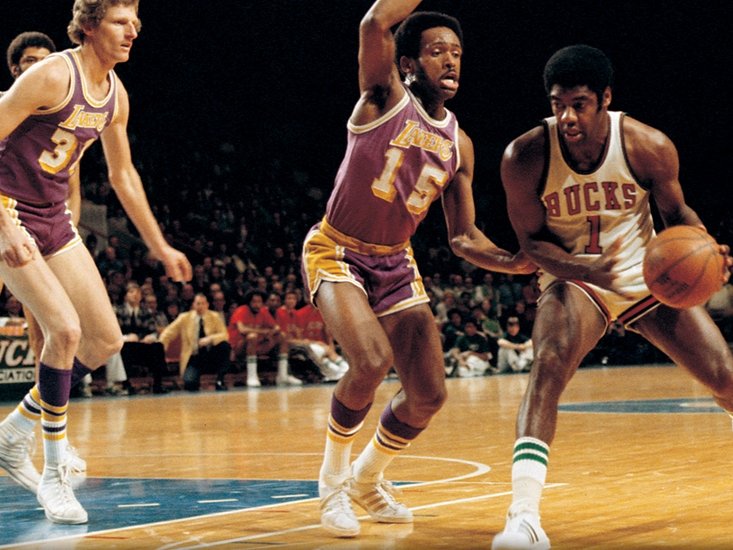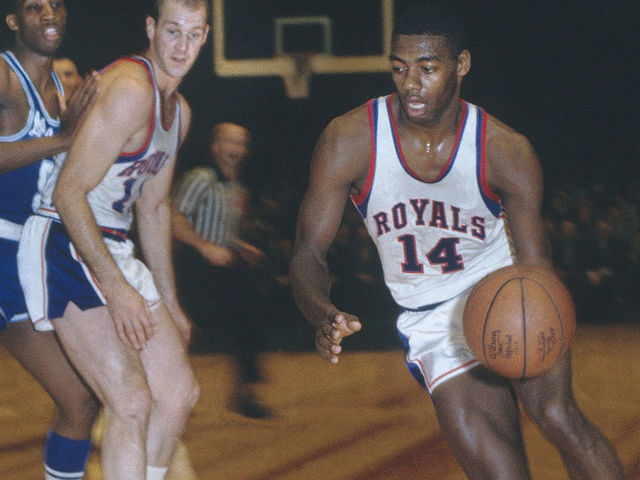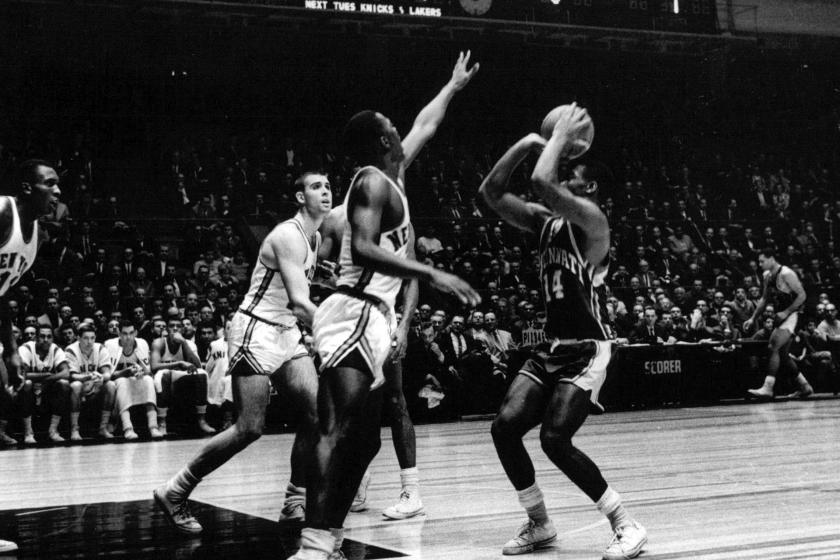Oscar Robertson (Part 3)
Oscar Robertson (Part 3)

Prior to the 1970–71 NBA season, the Cincinnati Royals shocked the basketball world by trading Oscar Robertson to the Milwaukee Bucks in exchange for Flynn Robinson and Charlie Paulk. Although no official reasons were given for the trade, many speculated that head coach Bob Cousy was envious of the attention Robertson received. Robertson himself expressed disappointment, stating that he believed Cousy was wrong, and he would never forget it.
The strained relationship between Robertson and the Royals had reached a breaking point, with Cincinnati also exploring trade options with other teams such as the Los Angeles Lakers and the New York Knicks. Although the details of potential deals with the Knicks remain unknown, the Royals did inquire about Lakers stars Jerry West and Wilt Chamberlain, but the Lakers refused to consider trading them. The trade to Milwaukee proved to be a turning point for Robertson, as he was paired with young star Lew Alcindor (later known as Kareem Abdul-Jabbar).
With Alcindor dominating the low post and Robertson leading the backcourt, the Bucks enjoyed a remarkable season, posting a league-best record of 66–16. They embarked on a historic 20-game winning streak and cruised through the 1971 NBA playoffs with a dominant 12–2 record, culminating in a 4–0 series sweep of the Baltimore Bullets in the NBA Finals. In his first NBA Finals game, Robertson contributed 22 points, 7 rebounds, and 7 assists to help secure the championship, marking the first title of his illustrious career.
Off the court, Robertson made significant contributions to NBA history through his involvement in the landmark lawsuit Robertson v. National Basketball Ass'n, which addressed antitrust issues within the league. As the president of the Players Association, Robertson played a pivotal role in advocating for players' rights, leading to reforms in the league's draft and free agency clauses. The lawsuit ultimately encouraged the signing of more free agents and paved the way for higher salaries for all players.
Despite being in the twilight of his career, Robertson remained a valuable asset on the court for the Bucks, helping them secure two more division titles in the 1971–72 and 1972–73 seasons. In his final season, Robertson played a key role in guiding the Bucks to the 1974 NBA Finals, where they faced the Boston Celtics. Although the Bucks fell short in a hard-fought seven-game series, Robertson's impact on the team was undeniable.
After retiring from basketball, Robertson was recognized for his contributions to the sport when he was elected to the Wisconsin Athletic Hall of Fame in 1995, cementing his legacy as one of the greatest players in NBA history.
After retiring from his playing career, Oscar Robertson remained actively involved in various endeavors, particularly focusing on improving living conditions for African-Americans in his native Indianapolis. He also ventured into broadcasting, working as a color commentator alongside Brent Musburger on CBS during the 1974–75 NBA season. Known for his trademark expressions such as "Oh, my!" and "Oh, Brent, did you see that!", Robertson brought excitement to televised games with his colorful commentary. He returned to the broadcast booth in the 1988–89 season, calling games on TBS with Hot Rod Hundley.
Robertson's impact on the court was recognized by both the Kansas City Kings (formerly the Royals) and the Milwaukee Bucks, who retired his jersey numbers, No. 14 and No. 1, respectively. In 1994, a bronze statue honoring Robertson was erected outside the Fifth Third Arena at the University of Cincinnati, commemorating his legendary career with the Bearcats. The statue was later relocated to the entrance of the Richard E. Lindner Athletics Center at the university.
Beyond basketball, Robertson served as a director for Countrywide Financial Corporation from 2000 until its sale to Bank of America in 2008. In July 2004, he took on the role of interim head coach for the Cincinnati Bearcats men's basketball team during head coach Bob Huggins' suspension. Robertson's impact on college basketball was further recognized when he was inducted into the National Collegiate Basketball Hall of Fame as part of its founding class in 2006, alongside other legends such as John Wooden, Bill Russell, Dean Smith, and James Naismith.
In January 2011, Robertson joined a class action lawsuit against the NCAA in O'Bannon v. NCAA, challenging the organization's use of former student-athletes' images. Additionally, in 2015, Robertson became involved in marijuana legalization efforts in Ohio, serving as one of the investors behind a legalization initiative placed on the state ballot. Although the initiative was initially defeated, subsequent efforts in Ohio succeeded in 2023.
Oscar Robertson's legacy in the NBA is unparalleled, as he is widely regarded as one of the greatest players in the history of the sport. Known for his exceptional scoring ability, playmaking skills, and versatility, Robertson left an indelible mark on the game.
As a rookie, Robertson immediately made an impact, averaging an impressive 30.5 points, 10.1 rebounds, and 9.7 assists per game, narrowly missing out on averaging a triple-double for the entire season. Throughout his career, he continued to dominate on the court, averaging more than 30 points per game in six of his first seven seasons and setting numerous records along the way.
One of Robertson's most remarkable achievements was his ability to consistently record triple-doubles. He finished his career with 181 triple-doubles, a record that stood for decades until Russell Westbrook surpassed it in the 2020-21 season. Robertson's versatility extended beyond statistical accomplishments, as he was also a pioneer in the evolution of the guard position. Standing at 6 feet 5 inches tall, he was one of the first "big guards," paving the way for players like Magic Johnson.
Off the court, Robertson's contributions to the game have been equally significant. He was inducted into the Naismith Memorial Basketball Hall of Fame in 1980 and has been honored on numerous occasions, including being named to the NBA 35th and 50th Anniversary Teams. He received the "Player of the Century" award from the National Association of Basketball Coaches in 2000 and was ranked as the second greatest point guard of all time by ESPN in 2006.
In recognition of his extraordinary career, the NBA renamed its Western Conference championship trophy after Robertson in 2022. His impact on the game of basketball transcends statistics and accolades, cementing his legacy as one of the all-time greats.
References
- "Definitive Notice & Proxy Statement". Sec.gov. Archived from the original on September 24, 2015. Retrieved May 8, 2015.
- ^ "Hall of Famer will serve until Huggins returns". Sports.espn.go.com. July 21, 2004. Archived from the original on October 17, 2015. Retrieved May 8, 2015.
- ^ Wetzel, Dan (January 26, 2011). "Robertson joins suit vs. NCAA". Yahoo! Sports. Archived from the original on March 3, 2016.
- ^ "'The Big O' backs pot legalization". ESPN. Associated Press. January 31, 2015. Archived from the original on June 4, 2016. Retrieved May 26, 2016.
- ^ Borchardt, Jackie (September 21, 2015). "What you need to know about Issue 3 -- Ohio's marijuana legalization measure". Northeast Ohio Media Group. Archived from the original on May 13, 2016. Retrieved May 26, 2016.
- ^ Saker, Anne (October 27, 2015). "Deters, Big O star in pro-Issue 3 ads". The Cincinnati Enquirer. Archived from the original on July 13, 2021. Retrieved May 26, 2016.
- ^ Borchardt, Jackie (November 3, 2015). "Ohio marijuana legalization measure fails". cleveland.com. Archived from the original on March 24, 2016. Retrieved May 26, 2016.
- a b "Daily Dime: Special Edition – The 10 Greatest Point Guards Ever". Archived from the original on January 24, 2016. Retrieved January 25, 2007.
- ^ Wojnarowski, Adrian (November 19, 2006). "Making triple trouble". Archived from the original on August 5, 2011. Retrieved January 31, 2007.
- a b c Flatter, Ron. "ESPN Classic – Oscar defined the triple-double". Archived from the original on June 6, 2011. Retrieved January 31, 2007.
- ^ "NBA at 50: Top 50 Players". NBA.com. Retrieved February 28, 2022.
- ^ "NBA 75: At No. 12, Oscar Robertson was more than a triple-double legend; he was a visionary leader".
- ^ "Children's Museum unveils 'sports legends' for new outdoor exhibit". Indiana Business Journal. September 12, 2017. Archived from the original on January 26, 2019. Retrieved September 13, 2017.
- ^ "NBA redesigns Finals trophy, adds awards named after Magic Johnson, Larry Bird". Washington Post. May 12, 2022. To complete the postseason collection, the NBA updated its conference championship trophies, first created in 2001, and renamed them after Hall of Famers Bob Cousy (for the East) and Oscar Robertson (for the West)
- ^ Robertson, Oscar (2003). The Big O: My Life, My Times, My Game. Rodale. ISBN 9781579547646. Archived from the original on May 31, 2006. Retrieved July 9, 2020.


















































